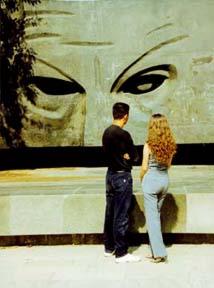
Autumn
1999 (7.3)
Editorial:
Eyewitness
of the Century
by
Betty Blair

 It used to puzzle me how Azerbaijanis
could know so little about the most prominent landmark in Baku
- Maiden's Tower (Giz Galasi). Even historians cannot pinpoint
with absolute certainty the original date of its construction,
or tell if it was an integral part of a larger defense system
or some religious belief or cosmological system.
It used to puzzle me how Azerbaijanis
could know so little about the most prominent landmark in Baku
- Maiden's Tower (Giz Galasi). Even historians cannot pinpoint
with absolute certainty the original date of its construction,
or tell if it was an integral part of a larger defense system
or some religious belief or cosmological system.
An abundance of legends attempt to explain its name - "Maiden"
- in terms of virginity, despite the fact that the term probably
implies that the stronghold was never conquered by the enemy.
One story describes a young girl who leapt from the tower's heights
into the sea after running out of ways to fend off her father's
advances. But Azerbaijan's folklorists claim such a myth was
contrived during the Soviet period to target khans, landowners
and other "exploiters" of the masses-ideological enemies
of socialism.
 But when one considers
how much has been lost or not ever
But when one considers
how much has been lost or not ever known about events that have occurred
this century or even this past decade, it's quite amazing that
anything at all is known about such ancient monuments.
known about events that have occurred
this century or even this past decade, it's quite amazing that
anything at all is known about such ancient monuments.
Right: Statue to Richard
Zorge, a celebrated spy of the Soviet Union during World War
II. Zorge was born in Baku. Much of this century has been marked
by "watchful eyes" that have too often rendered Azerbaijanis
mute to the historical processes of this century. Photo: Pirouz
Khanlou, August 1999 (See front cover).
So many details about the historical events that took place this
century have been lost. So many valuable things are unknown,
so many mysteries are still locked in Moscow's KGB archives and
so much truth has never been documented, especially as it relates
to the role that the Soviet intelligence service played in the
tragic events of Stepanakert (1988), Sumgayit (1989), Baku's
Black January (1990) and the ease with which Shusha was captured
(1992). For Azerbaijan, the nation's problem of losing its historical
memory is so pervasive that the 20th century could well be dubbed
"The Century of Amnesia".
In this issue, the third this year in our "Century Series",
we've turned to personal eyewitness accounts to describe some
of the determining events that have shaped this century. Oral
history these days is being taken seriously for its significant
contributions to the historical record. After all, there are
many perspectives that comprise history, not just the ones created
and recorded by leaders.
Of course, in any nation over the course of time, it's only natural
that many memories about the events that shaped history will
be lost due to death and dementia. But there are certain factors
contributing to the loss of memory that are specific to Azerbaijan
and the Soviet Union.
Alphabet Changes
For example, it's hard to imagine another country in the entire
world that has changed its alphabet as many times as Azerbaijan
has during this century. In fact, four major shifts have taken
place in the short span of less than 65 years (1926-1991). The
1,300-year usage of the Arabic script was replaced by Latin (1926),
then Cyrillic (1939) and then Latin again (1991).
With every alphabet change, even when the change can be justified
politically (as each of these changes has been), there has been
a tremendous loss of information and knowledge, which has resulted
in a disjuncture between generations. Essentially, alphabet changes
result in the loss of communal and cultural memory. Individuals
on society's periphery-the aged and the youth, grandparents and
grandchildren-suffer the most. The older generation is denied
access to newer ideas and information, while the younger generation
is cut off from the tremendous wealth of knowledge that has been
accumulated by their predecessors. Such a loss of memory is tragic
and often never recoverable.
Political Systems
Another major cause of amnesia this century was that governments
were replaced by antithetical political systems. The capitalist
system during the Oil Boom period (1885-1920) gave way when progressive
leaders tried to democratize the system, creating the Azerbaijan
Democratic Republic (1918-1920).
Then the Bolsheviks imposed a socialist system (1920-1991). Finally,
when the Soviet Union collapsed, Azerbaijan attempted to establish
a government based upon the principles of market economy.
Since each political system has reversed the previous system,
Azerbaijanis have had to become uniquely adept at being "politically
correct". The consequences of not being able to read the
signs of the times were severe.
Stalin's Repressions
From
1924 until Stalin died in 1953, his policies helped to castrate
Azerbaijan's historical memory. So many political activists and
members of the intelligentsia were either executed or sent into
exile during this period. In Azerbaijan alone, tens of thousands
of people were arrested to provide cheap labor for the development
of Siberia and other Central Asian territories. In the Soviet
Union, the figure ran into the millions.
Such deliberate policies were extremely effective in breaking
generational ties and instilling tremendous fear, causing parents
to be afraid to even trust their own children.
The writer Anar in his chilling story, "Morning
of That Night" (see AI 7.1, Spring 1999), provides a poignant
example. Two parents fear for their own arrest simply because
their daughter, in the privacy of their home, sang her doll to
sleep with a lullaby composed by a neighbor who had been arrested
a few weeks earlier.
In reality, the significance of Stalin's repression is that by
killing tens of thousands of people, the memory links between
generations were broken. Already by the 1950s, young people had
almost no idea that there had been giants among their own people
who had lost their lives to oppose the socialist system. The
older generations who knew the truth were petrified to talk about
it, even in the privacy of their homes.
Russian Language
Another major contributor to the enormous loss of memory this
century has been the shift to embrace the Russian language in
everyday discourse. Naturally, during the Soviet period, the
staircase to success was through the Russian language. In the
public schools, the "Russian Track" was, and still
continues to be, the superior educational system. Such a policy
has deprived Azerbaijanis of the opportunity to learn about their
own writers and other great thinkers. Azerbaijani youth studied
Pushkin, but not Nizami, Tchaikovsky, but not Hajibeyov. Such
policies resulted in an incredible lapse of cultural memory.
In Azerbaijan today, Russian still dominates in Baku. Russians
living there don't know the country's official state language,
Azeri, and many Azerbaijanis are more fluent in Russian than
in their own mother tongue.
Exile
The forced migrations of millions of Azerbaijanis has also contributed
to the loss of memory. The first exodus occurred when the Bolsheviks
took control of the government (1920). Azerbaijan's most brilliant
entrepreneurs fled en masse. Those who stayed behind rarely lived
to tell the story. Today, the ornate residences in the center
of Baku bear witness to their previous owners, but only the monograms
remain. In many cases their names are unknown.
Those who led the fledgling government of the Azerbaijan Democratic
Republic (1918-1920) faced the same fate. Many fled; most of
those who remained were killed.
Another forced migration of several hundred thousand Azerbaijanis
occurred in the mid-1920s, when Stalin gave the Zangazur region
of Azerbaijan to Armenia. This narrow strip-barely 46 kilometers
wide-now separates Azerbaijan from the Azerbaijani region of
Nakhchivan, effectively cutting off any possible alliance between
Turkic-speaking Baku and Turkey.
Then in the 1930s, another mass exodus was carried out, when
tens of thousands of Azerbaijanis from Iran were forced to return
home under Stalin's injunction. They had originally come to Baku
during the Oil Boom seeking economic opportunities.
Then there was 1937-known as one of the most notorious years
in Soviet history-when Stalin arrested tens of thousands of Azerbaijanis.
Some were executed; many were exiled. Some managed to survive
until Stalin's death in 1953 and eventually found their way back
home.
Another mass migration organized by the Soviet government occurred
between 1948 and 1950, when several hundred thousand Azerbaijanis
were deported en masse from Armenia, despite the fact that Azerbaijanis
had been living there for thousands of years. Although most mass
deportations during Stalin's regime took place on the eve of
World War II, curiously this exile was organized during peacetime
when the victory of war was being celebrated.
Of course, the Azerbaijan-Armenian conflict has contributed to
one of the greatest exiles in this century. Since 1988, nearly
1 million Azerbaijanis have had to flee their homes-both from
Armenia and from the Azerbaijani territory of Nagorno-Karabakh
and the seven surrounding regions that Armenians have occupied
militarily beginning in 1992.
In addition to exiles of ethnic nature, since the collapse of
the Soviet Union, severe economic conditions have forced many
to seek employment in Russia, Israel, Turkey, Europe and the
U.S. All of these exiles have resulted in an immense loss of
memory, effectively breaking the links between generations, culture,
language, circles of influence and world view.
In this issue, we've tried to provide a general overview of many
of the determining events that have shaped this century. Of course,
such material could fill an encyclopedia. We hope in future issues
to fill in some of the gaps that, out of necessity, have been
left out this time.
Our wish for the next century and for the next millenium is that
Azerbaijan will never again experience such a collective loss
of memory. Hopefully, systems will not need to be reversed-whether
political, economic, educational or cultural. May there never
again in the history of this nation be so many factors that contribute
to the loss of national memory.
Home
| About
Azeri | Learn
Azeri | Arabic
Script | Store | Contact
us
Articles from Azerbaijan
International
© Azerbaijan International. Copyright 2003. All rights reserved.
|
|